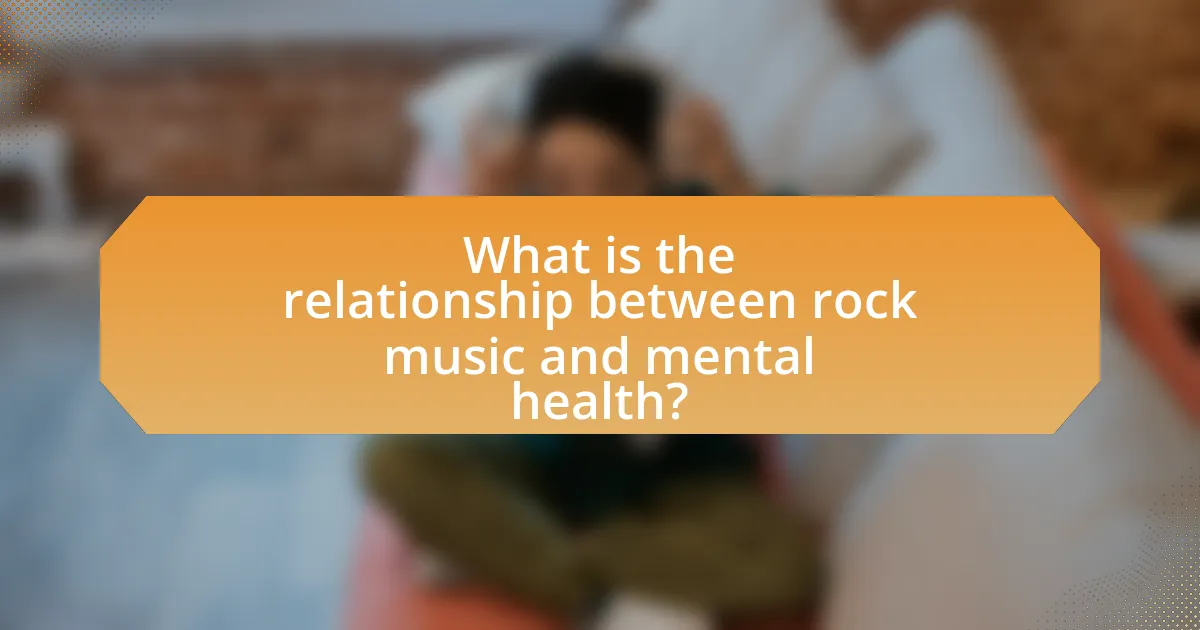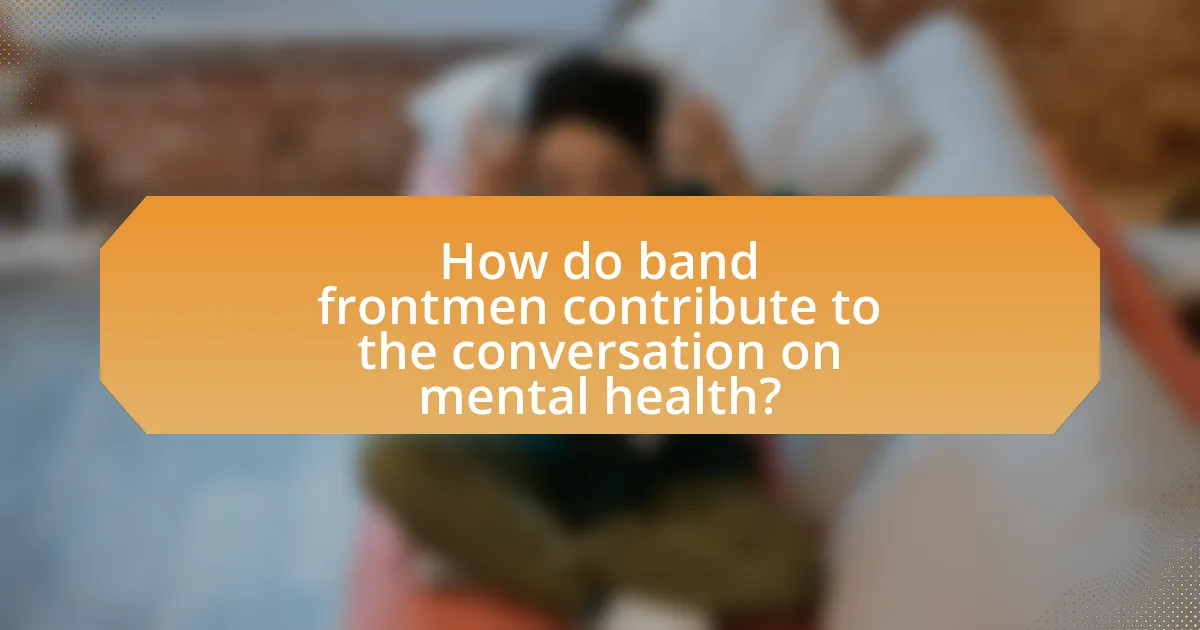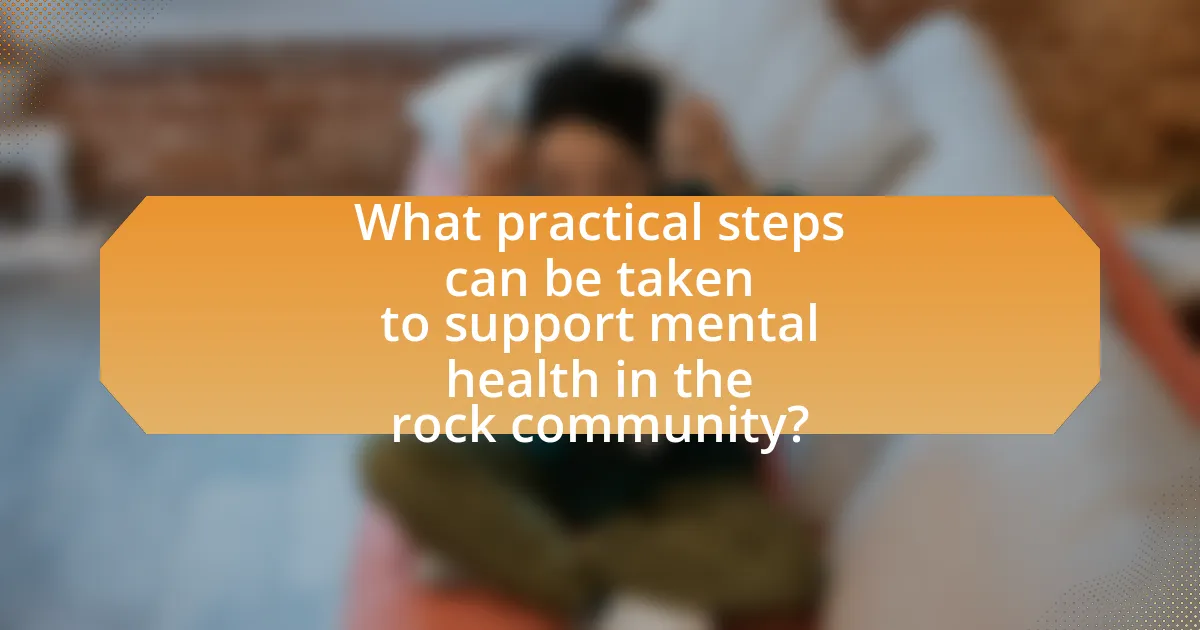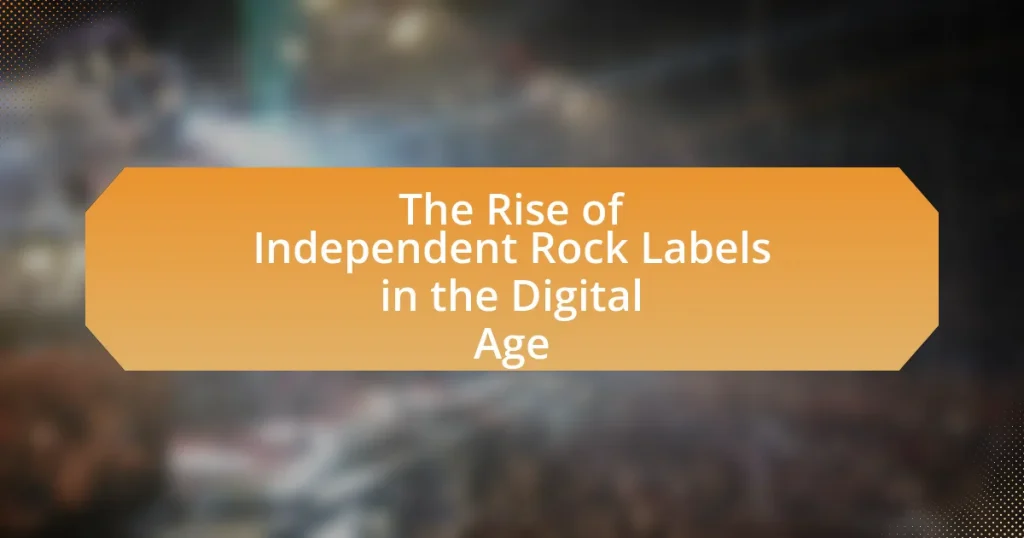The article explores the intricate relationship between rock music and mental health, highlighting how rock serves as both a form of expression and a coping mechanism for individuals facing emotional distress. It discusses the influence of rock music on mental health awareness, emphasizing themes such as depression, anxiety, and resilience found in the lyrics of prominent bands. The article also examines the role of musicians in promoting mental health discussions, the challenges they face, and the importance of vulnerability in fostering connections with fans. Additionally, it outlines practical steps for supporting mental health within the rock community and resources available for musicians struggling with mental health issues.

What is the relationship between rock music and mental health?
Rock music has a complex relationship with mental health, often serving as both a form of expression and a coping mechanism for individuals experiencing emotional distress. Research indicates that listening to rock music can provide a sense of belonging and validation for those struggling with mental health issues, as it often addresses themes of pain, rebellion, and resilience. For instance, a study published in the Journal of Music Therapy found that engaging with rock music can lead to improved mood and reduced feelings of isolation among listeners. Additionally, many rock musicians openly discuss their mental health challenges, which can destigmatize these issues and encourage fans to seek help.
How does rock music influence mental health awareness?
Rock music significantly influences mental health awareness by addressing themes of struggle, resilience, and emotional expression. Many rock songs openly discuss mental health issues, such as depression and anxiety, which helps to destigmatize these topics and encourages listeners to seek help. For instance, bands like Linkin Park and Nirvana have openly tackled mental health struggles in their lyrics, resonating with fans and fostering a sense of community and understanding. Research indicates that music, including rock, can serve as a therapeutic tool, promoting emotional release and connection, which is crucial for mental well-being.
What themes in rock music address mental health issues?
Themes in rock music that address mental health issues include depression, anxiety, addiction, and existential crises. Many rock songs explore the emotional struggles associated with these themes, often reflecting personal experiences of artists. For instance, Nirvana’s “Lithium” delves into the complexities of bipolar disorder, while Pink Floyd’s “Comfortably Numb” addresses feelings of alienation and disconnection. Additionally, Linkin Park’s “Crawling” articulates the internal battle with self-doubt and anxiety. These examples illustrate how rock music serves as a medium for expressing and confronting mental health challenges, resonating with listeners who may share similar experiences.
How do lyrics in rock songs reflect mental health struggles?
Lyrics in rock songs often reflect mental health struggles by addressing themes of anxiety, depression, and emotional turmoil. Many rock artists use their personal experiences to convey feelings of isolation and despair, creating a relatable narrative for listeners. For instance, songs like “Creep” by Radiohead explicitly articulate feelings of inadequacy and alienation, while “Numb” by Linkin Park explores the pressure to conform and the resulting emotional pain. These examples illustrate how rock lyrics serve as a medium for expressing complex mental health issues, resonating with audiences who may face similar challenges.
Why is it important to discuss mental health in the rock music community?
Discussing mental health in the rock music community is crucial because it addresses the high prevalence of mental health issues among musicians and fans. Research indicates that musicians are more likely to experience mental health challenges, with studies showing that 73% of musicians have experienced anxiety and 68% have faced depression. By fostering open conversations about mental health, the rock music community can reduce stigma, promote awareness, and encourage individuals to seek help, ultimately leading to healthier lives and more supportive environments.
What role do musicians play in promoting mental health discussions?
Musicians play a crucial role in promoting mental health discussions by using their platforms to raise awareness and destigmatize mental health issues. Through lyrics, interviews, and social media, artists openly share their personal experiences with mental health challenges, encouraging fans to engage in conversations about their own struggles. For instance, studies show that musicians like Lady Gaga and Logic have significantly impacted public perception of mental health by addressing topics such as depression and anxiety in their work, leading to increased dialogue and support within their fan communities. This visibility not only fosters a sense of connection but also empowers individuals to seek help, demonstrating the influential role musicians have in shaping mental health discourse.
How can fans benefit from these discussions?
Fans can benefit from discussions about rock and mental health by gaining insights into the emotional struggles faced by artists, which can foster a sense of connection and understanding. These discussions often highlight the importance of mental health awareness, encouraging fans to seek help and support for their own mental health challenges. For instance, when a band frontman shares personal experiences with mental health issues, it can validate fans’ feelings and reduce stigma, as evidenced by studies showing that public figures discussing mental health can lead to increased openness among their followers.
What challenges do rock musicians face regarding mental health?
Rock musicians face significant challenges regarding mental health, including high levels of stress, substance abuse, and the pressures of fame. The demanding nature of touring and performing can lead to anxiety and depression, as musicians often experience isolation and a lack of stability in their personal lives. Research indicates that musicians are three times more likely to suffer from depression compared to the general population, highlighting the severity of these mental health issues within the industry. Additionally, the culture of substance use in rock music can exacerbate mental health problems, creating a cycle that is difficult to escape.
How does the lifestyle of a touring musician impact mental health?
The lifestyle of a touring musician significantly impacts mental health by exposing individuals to high levels of stress, isolation, and irregular sleep patterns. Constant travel, performance pressure, and the demands of maintaining a public persona can lead to anxiety and depression. Research indicates that musicians experience mental health issues at a higher rate than the general population, with a study published in the Journal of Affective Disorders revealing that 71% of musicians reported experiencing anxiety and 68% reported depression. Additionally, the lack of a stable routine and social support while on tour can exacerbate feelings of loneliness, further affecting mental well-being.
What stigma exists around mental health in the rock music scene?
The stigma around mental health in the rock music scene often manifests as a perception that vulnerability is a weakness, leading to reluctance among artists to openly discuss their struggles. This stigma is reinforced by the culture of rock music, which frequently celebrates rebellion and toughness, creating an environment where mental health issues are minimized or ignored. For instance, a survey conducted by the Music Industry Research Association found that 73% of musicians reported experiencing anxiety or depression, yet many feel pressured to maintain a façade of strength, fearing that acknowledgment of their mental health challenges could jeopardize their careers.

How do band frontmen contribute to the conversation on mental health?
Band frontmen contribute to the conversation on mental health by openly discussing their personal struggles and advocating for mental health awareness. For instance, many frontmen, such as Chester Bennington of Linkin Park and Dave Grohl of Foo Fighters, have shared their experiences with depression and anxiety, helping to destigmatize these issues. Their visibility in the music industry allows them to reach a wide audience, encouraging fans to seek help and fostering a supportive community. Research indicates that public figures discussing mental health can significantly influence societal attitudes, making their contributions vital in promoting understanding and acceptance.
What personal experiences do band frontmen share about mental health?
Band frontmen often share personal experiences of struggling with mental health issues such as anxiety, depression, and substance abuse. For instance, artists like Chester Bennington of Linkin Park openly discussed his battles with depression and the impact of childhood trauma on his mental well-being. Similarly, Dave Grohl of Foo Fighters has spoken about the pressures of fame and the importance of seeking help, emphasizing that mental health struggles are common in the music industry. These candid revelations highlight the prevalence of mental health challenges among musicians and the necessity of addressing these issues openly.
How do these experiences resonate with fans?
Experiences related to mental health in rock music resonate with fans by fostering a sense of connection and understanding. Fans often relate to the struggles and emotions expressed in lyrics, which can mirror their own experiences with mental health challenges. For instance, studies show that music can serve as a therapeutic outlet, with 70% of individuals reporting that listening to music helps them cope with stress and anxiety. This shared emotional landscape creates a community among fans, where they feel validated and less isolated in their struggles.
What coping strategies do they discuss publicly?
The coping strategies discussed publicly by the band frontman include open communication about mental health, engaging in physical exercise, and practicing mindfulness techniques. These strategies are emphasized as essential for managing stress and emotional challenges in the music industry. The frontman highlights that sharing personal experiences with mental health can foster a supportive community, while regular physical activity is shown to improve mood and reduce anxiety, as supported by numerous studies on exercise and mental well-being. Mindfulness practices, such as meditation, are also noted for their effectiveness in enhancing emotional regulation and reducing stress levels.
Why is vulnerability important for band frontmen in addressing mental health?
Vulnerability is important for band frontmen in addressing mental health because it fosters authenticity and connection with their audience. When frontmen openly share their struggles, they not only humanize themselves but also create a safe space for fans to discuss their own mental health issues. Research indicates that artists who express vulnerability can reduce stigma around mental health, as seen in studies like the one conducted by the American Psychological Association, which highlights that public figures discussing their mental health challenges can encourage others to seek help. This openness can lead to a supportive community, ultimately benefiting both the frontmen and their fans.
How does sharing personal struggles help break stigma?
Sharing personal struggles helps break stigma by fostering openness and understanding around mental health issues. When individuals share their experiences, it humanizes the challenges associated with mental health, making it easier for others to relate and empathize. Research indicates that personal narratives can reduce stigma by demonstrating that mental health issues are common and affect many people, thereby normalizing the conversation. For instance, a study published in the journal “Psychological Science” found that sharing personal stories can lead to increased acceptance and reduced prejudice towards those with mental health conditions.
What impact does vulnerability have on fan relationships?
Vulnerability significantly enhances fan relationships by fostering deeper emotional connections. When artists openly share their struggles and insecurities, fans often feel a sense of relatability and authenticity, which strengthens their loyalty and support. Research indicates that emotional transparency can lead to increased fan engagement, as evidenced by studies showing that fans are more likely to connect with artists who discuss personal challenges, such as mental health issues. This connection can create a supportive community around the artist, where fans feel understood and valued, ultimately enriching the overall fan experience.
How can band frontmen use their platform to advocate for mental health?
Band frontmen can use their platform to advocate for mental health by openly discussing their own struggles and promoting mental health resources during performances and interviews. By sharing personal experiences, they can destigmatize mental health issues and encourage fans to seek help. For instance, studies show that public figures discussing mental health can significantly influence public perception and increase awareness, as seen with artists like Logic, who addressed suicide prevention in his song “1-800-273-8255,” leading to a surge in calls to the National Suicide Prevention Lifeline.
What initiatives have been launched by musicians to support mental health?
Musicians have launched various initiatives to support mental health, including the “Music Minds Matter” program by the U.K. music charity Help Musicians, which provides mental health support and resources specifically for those in the music industry. Additionally, the “Mental Health Coalition,” co-founded by artists like Lady Gaga and Shawn Mendes, aims to raise awareness and reduce stigma surrounding mental health issues. These initiatives are backed by statistics indicating that musicians face higher rates of mental health challenges, with a 2019 study revealing that 73% of musicians experience anxiety or depression.
How can collaborations with mental health organizations enhance their message?
Collaborations with mental health organizations can enhance their message by leveraging the credibility and reach of both parties to promote awareness and understanding of mental health issues. When a band partners with a mental health organization, they can utilize their platform to share personal stories and experiences, which resonate with fans and encourage open discussions about mental health. For instance, research shows that celebrity endorsements can significantly increase public engagement with mental health topics, as seen in campaigns like the “Time to Change” initiative in the UK, which successfully reduced stigma through high-profile collaborations. This synergy not only amplifies the message but also fosters a supportive community, ultimately leading to increased resources and support for those in need.

What practical steps can be taken to support mental health in the rock community?
To support mental health in the rock community, implementing regular mental health awareness programs is essential. These programs can include workshops, seminars, and discussions that focus on mental health education, reducing stigma, and promoting open conversations about mental health challenges faced by musicians and fans alike. Research indicates that musicians experience higher rates of mental health issues, with a study published in the Journal of Affective Disorders revealing that 71% of musicians have experienced anxiety or depression. Additionally, creating safe spaces at concerts and festivals for individuals to discuss their mental health can foster a supportive environment. Providing access to mental health resources, such as counseling services and hotlines specifically tailored for musicians, can further enhance support.
How can fans support their favorite musicians’ mental health?
Fans can support their favorite musicians’ mental health by actively promoting open conversations about mental health and showing understanding and empathy. Engaging in discussions on social media, sharing mental health resources, and encouraging musicians to prioritize their well-being can create a supportive environment. Research indicates that social support significantly impacts mental health, with studies showing that musicians often face unique stressors, including performance anxiety and public scrutiny. By fostering a culture of acceptance and understanding, fans can help reduce stigma and encourage musicians to seek help when needed.
What actions can fans take to create a supportive environment?
Fans can create a supportive environment by actively promoting mental health awareness and fostering open communication. By sharing resources, such as hotlines and support groups, fans can help others access necessary assistance. Additionally, fans can engage in positive discussions on social media, encouraging dialogue about mental health challenges faced by artists and fans alike. Research indicates that supportive communities can significantly reduce feelings of isolation, which is crucial for mental well-being. For instance, a study published in the Journal of Community Psychology found that social support is linked to lower levels of depression and anxiety among individuals facing mental health issues.
How can fans engage in conversations about mental health with artists?
Fans can engage in conversations about mental health with artists by utilizing social media platforms to share their experiences and support. Artists often discuss their own mental health journeys publicly, creating an open environment for fans to connect. For instance, during live Q&A sessions or through comments on posts, fans can ask questions or share personal stories, fostering dialogue. Research indicates that social media can serve as a vital tool for mental health awareness, as it allows for real-time interaction and community building. This engagement not only helps destigmatize mental health issues but also strengthens the bond between fans and artists, as seen in various artist-led mental health initiatives.
What resources are available for musicians struggling with mental health?
Musicians struggling with mental health can access various resources, including mental health hotlines, therapy services, and support groups specifically tailored for artists. Organizations like MusiCares provide financial assistance and mental health support to musicians in need. Additionally, the Music Industry Mental Health Coalition offers resources and advocacy for mental health awareness within the music community. Research indicates that musicians face higher rates of mental health issues, emphasizing the importance of these resources in providing necessary support and intervention.
What organizations provide support specifically for musicians?
Organizations that provide support specifically for musicians include the Musicians’ Assistance Program, which offers mental health services and financial assistance, and the Recording Academy’s MusiCares, which provides health and wellness resources. Additionally, the American Federation of Musicians offers various support services, including legal assistance and financial aid. These organizations are dedicated to addressing the unique challenges faced by musicians, including mental health issues and financial instability, thereby reinforcing their commitment to the well-being of artists in the music industry.
How can musicians access mental health services while on tour?
Musicians can access mental health services while on tour by utilizing telehealth platforms, which allow for remote consultations with licensed therapists. Many organizations, such as the Music Industry Mental Health Fund, provide resources specifically for musicians, including access to mental health professionals who understand the unique challenges of touring. Additionally, some touring companies and venues offer on-site mental health support or partnerships with local mental health services, ensuring that musicians have immediate access to care during their travels.
What are some best practices for maintaining mental health in the music industry?
Best practices for maintaining mental health in the music industry include establishing a strong support network, prioritizing self-care, and setting boundaries. A strong support network, consisting of friends, family, and mental health professionals, provides emotional stability and guidance, which is crucial in an industry known for its pressures. Prioritizing self-care involves regular physical activity, healthy eating, and sufficient sleep, all of which contribute to overall well-being. Setting boundaries helps manage the demands of touring and performing, reducing stress and preventing burnout. Research indicates that musicians are at a higher risk for mental health issues, making these practices essential for sustaining mental health in a challenging environment.
How can musicians establish a healthy work-life balance?
Musicians can establish a healthy work-life balance by setting clear boundaries between their professional and personal lives. This involves scheduling specific times for practice, performances, and personal activities, ensuring that they allocate time for rest and social interactions. Research indicates that maintaining a structured routine can reduce stress and enhance overall well-being, as highlighted in a study published in the Journal of Occupational Health Psychology, which found that individuals with defined work-life boundaries reported higher job satisfaction and lower burnout rates. By prioritizing self-care and time management, musicians can effectively navigate the demands of their careers while preserving their mental health.
What self-care strategies can be implemented by artists and fans alike?
Artists and fans can implement self-care strategies such as mindfulness practices, regular physical activity, and establishing healthy boundaries. Mindfulness practices, including meditation and deep breathing exercises, help reduce stress and enhance emotional well-being, which is crucial in the high-pressure environment of the music industry. Regular physical activity, such as walking or dancing, promotes mental health by releasing endorphins, which can alleviate feelings of anxiety and depression. Establishing healthy boundaries, such as limiting social media engagement and setting aside time for personal interests, allows both artists and fans to maintain a balanced lifestyle and prevent burnout. These strategies are supported by research indicating that mindfulness and physical activity significantly contribute to improved mental health outcomes.



